The President’s War Is Lacking A Convincing Plan
The Administration's policy in the President's war against ISIS has no coherent plan, and that virtually guarantees escalation.
The New York Times Editorial Board goes after the President for the lack of any coherent plan in his war against ISIS:
President Obama has put America at the center of a widening war by expanding into Syria airstrikes against the Islamic State, the Sunni extremist group known as ISIS and ISIL. He has done this without allowing the public debate that needs to take place before this nation enters another costly and potentially lengthy conflict in the Middle East.
He says he has justification for taking military action against the Islamic State and Khorasan, another militant group. But his assertions have not been tested or examined by the people’s representatives in Congress. How are Americans to know whether they have the information to make any judgment on the wisdom of his actions?
There isn’t a full picture — because Mr. Obama has not provided one — of how this bombing campaign will degrade the extremist groups without unleashing unforeseen consequences in a violent and volatile region. In the absence of public understanding or discussion and a coherent plan, the strikes in Syria were a bad decision.
Mr. Obama has failed to ask for or receive congressional authorization for such military action. The White House claims that Mr. Obama has all the authority he needs under the 2001 law approving the use of force in Afghanistan and the 2002 law permitting the use of force in Iraq, but he does not. He has given Congress notification of the military action in Iraq and Syria under the 1973 War Powers Resolution, but that is not a substitute for congressional authorization.
The administration also claims that the airstrikes are legal under international law because they were done in defense of Iraq. In a Sept. 20 letter to the United Nations, Iraq complained that the Islamic State was attacking its territory and said American assistance was needed to repel the threat. But the United Nations Security Council should vote on the issue.
Meanwhile, Congress has utterly failed in its constitutional responsibilities. It has left Washington and gone into campaign fund-raising mode, shamelessly ducking a vote on this critical issue. That has deprived the country of a full and comprehensive debate over the mission in Syria and has shielded administration officials and military commanders from tough questions about every aspect of this operation — from its costs to its very obvious risks — that should be asked and answered publicly.
(…)
With so much at stake and so much unknown, before he gets any further into this operation, Mr. Obama needs to get Congress’s approval and prove that he has fully accounted for the consequences of this foray into Syria.
These criticisms strike me as being largely spot-on, with regard to the Administration’s lack of a coherent plan, the fact that the White House openly refused to submit the matter to Congress before the legislators left for a long scheduled election break (or to recall Congress in August when it was already apparent that this conflict was going to escalate), and Congress’s own failure to live up to its Constitutional duties in this matter. As I’ve noted before, we’ve already watched as, seemingly driven mostly by outside events over anything else, our involvement in hostilities against ISIS in Iraq has escalated from a mission aimed at humanitarian relief and protection of American diplomats to one where we are engaged in what can only be called a war without a war having actually been declared. Now, we seem to have a plan that relies in no small part on questionable “moderate” Syrian rebels, and Iraqi Army that still doesn’t seem to want to defend its own country, and an international coalition that seems willing to let the U.S. do the brunt of the work and which seems unlikely to provide the kind of ground forces that will likely ultimately be needed to dislodge ISIS from its strongholds in Iraq and Syria. Combine that with the fact that the Administration has provided a shifting explanation of the legal justification for the President’s unilateral actions ranging from Article II of the Constitution, to the 2001 AUMF authorizing attacks on al Qaeda, the 2002 AUMF authorizing the war against Iraq, and the United Nations and the entire operation begins to look more and more dubious. Given the fact that Administration officials and Pentagon officials are both saying that the campaign against ISIS is likely to last for years, it seems that the Administration owes the country something more before committing the nation to something that long time, assuming that it’s not already too late that is.
Prior to the President’s September 10th speech in which he effectively announced that he was expanding his war against ISIS into Syria, I wrote about several questions that David Ignatius posed regarding the plan that the President would be proposing that night. To date, for example, it does not appear that we have a coherent answer to any of them. There is no coherent exit strategy, and as noted above both the Administration and the Pentagon have doubled down on the message that this is a conflict that could take an extended period of time. Given that, it’s unclear how to know exactly what “victory” would be, and unless you know what victory is it seems as through it would be kind of difficult to come up with a plan that is anything other than reactionary. The problem with reactionary planning, of course, is that it very quickly leads to the very kind of escalation that we’re seeing today and which is likely to continue far into the future unless Congress takes up this matter and demands that the Administration present a coherent vision of what exactly it is we’re supposed to be accomplishing in this war the President has committed us to.
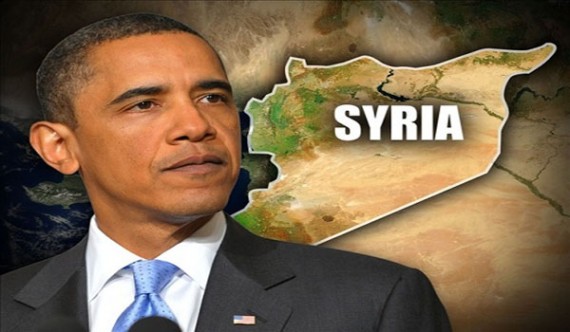


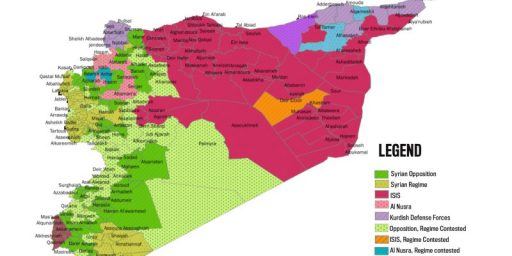
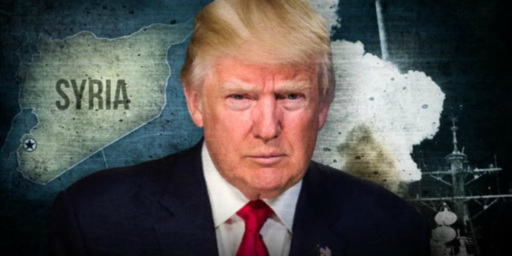
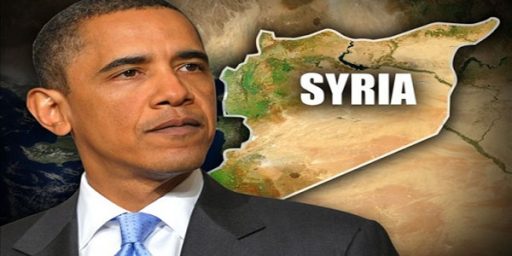
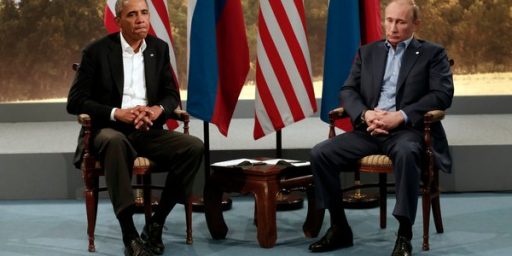
Commentary on this has been so thoroughly stupid it just depresses me. A bunch of people who bought Iraq hook, line and sinker, now want to make up for past mistakes by attacking this far less complicated matter of ISIL.
Idiots repeating the conventional wisdom of the day. Never a moment’s thought, just round and round and round with the same old crapola.
The strategy is obvious. There is no mystery. It’s right out there in plain sight.
@ Doug
This is just getting sad. You can do better – can’t you?
Michael,
I opposed the Iraq War. For many of the same reasons I oppose this unnecessary, incoherent adventure.
Anjin-San,
Is there someone else who is Commander in Chief of the U.S. military?
Doug:
And yet you never tell us what if anything we should do about ISIL? Or what we should do if they push into Jordan or Saudi Arabia. Why don’t you show your work? The other day you admitted you have no idea what to do, which makes you just another pair of jaws jacking.
There is nothing incoherent here. If you have trouble understanding, I’d be happy to explain. Maybe you could submit some questions here. Or you could just go on regurgitating the conventional wisdom of people who’ve been wrong on just about everything.
@ Doug
Ah, so then you see every war we have fought in our history as “The President’s War”?
You refer to WW2 as “Roosevelt’s War” and so on?
@michael reynolds:
I reject the notion that I’m under an obligation to provide an alternative plan because it presumes that I think we should be doing anything right now. Given the realities on the ground, I don’t believe that this is our fight. At the same time, if we are going to press forward with this endeavour then the President is under an obligation to present a plan that doesn’t rely on mythical “moderate” rebels, an Iraqi Army that cannot fight, and an international coalition that is content to tag along while we do all the dirty work. And Congress is under an obligation to fulfill its Constitutional obligations. Both branches of government are failing in their duties in that regard, in my opinion.
Maybe you or the NYT editors could explain when was the big Congressional debate on strategy before or after the declarations of WW1 or WW2, or if any President submitted their strategy for Congressional debate at any time in the Cold War. I don’t recall any firm end date or “exit strategy” for any of those conflicts. So far as I can tell, Lincoln did not lay out a coherent, clear timetable for winning the Civil War either.
Bottom line Doug, you and the NYT are asking for the the kind of certainties that no President has had to gaurantee.
As to a Congressional approval of the issue, allow me to let you in on a secret: Congress doesn’t WANT to debate or vote on the issue.Congress can take up this issue any g-d@mned time it wants.IT.DOESN’T. WANT.TO. That’s not Obama’s fault.
Moreover, if you think its strategy would be any more coherent than the President’s, then you’ve started drinking too early in the day.
I don’t see why ISIS is less complicated than Iraq.
When we started the Iraq folly, there was a secular dictator, moderately brutal, with no immediate aspirations beyond his borders, and a Kurdish north that was effectively out of the picture.
ISIS is fundamentalist, much more brutal, expanding, definitely trying to commit acts of terrorism outside the Middle East, locked in a battle with one of our enemies (Assad) and involved in a many part civil war.
Destroying Saddam Hussein’s regime was simple but stupid (he wasn’t doing anything), destroying ISIS is difficult (you can kill some people in leadership positions, but you can’t kill the fundamentalist radicalism that powers ISIS with bombs) but necessary (to protect our allies in the region, and to reduce the risk of terrorist attacks). ISIS isn’t an existential threat to the U.S., but they are intent on becoming a significant nuisance.
(And ISIS is a much better sounding name than ISIL)
Someone else on this site put it very well the other day; you cannot stop chaos, you can only hope to contain it. (fyi – they said the same thing about Michael Jordan)
Anyway…this isn’t a war. It’s a military action in aid to our friends in the region being executed by our assets already in the region. If and when it escalates beyond that…then, absolutely, we need to talk.
So far relatively little money is being spent and we are spilling no blood. By comparison this CinC is a military genius.
As for Congress…they are home
sucking up to donorscampaigning…that’s the best place for them.@Doug Mataconis: So, your plan is that we should sit this one out and see what happens?
It’s a fine plan if you don’t mind the humanitarian consequences (they were herding people up a mountain to slaughter them), beheading American citizens, and probably launching small to moderate sized terrorist attacks outside the Middle East.
I mostly agree, except I think we should be using our air power to prevent the humanitarian disasters when we can. And, while we are at it, try to limit their ability to plan and execute terrorist attacks.
But, beyond that, any solution really needs to come from the people of the region. All we can do it batter ISIS a bit in the meantime to minimize the worst effects.
Am I correctly inferring that you don’t want the US to do even that?
@Doug Mataconis:
You like polls, Doug?
So the American people are pretty clear that they want the US to take strong action against ISIS. Indeed, that’s why the President took action. He is a reluctant warrior here, who is taking action because the public wants him to. You do understand as well that ISIS beheaded two US citizens, right?
I agree that there is no plan but this is situation normal since WWII. There was no plan for Iraq, there was no plan for Afghanistan. We can go back much further – there was no plan for Korea or Vietnam.
The US doesn’t fight wars to win it fights wars to line the pockets of military contractors – that’s the only plan.
@Doug Mataconis:
1) The international coalition is flying bombing missions. You surely know this, so why repeat the falsehood? France, UAE and KSA have already flown, the UK will be in soon.
2) Who says we are “relying” on the FSA? The FSA is a piece on the board, not the only piece. Surely you know that as well.
3) As for the Iraqi army, all they are required to do is not lose any more ground. With our airpower they’ve already proven capable of this.
So your objections now dealt with, let’s move on to your notion that we should do nothing at all. This at least is a position. But if that’s your position, please explain what we do if ISIL takes down the Kurds or Jordan or Saudi Arabia.
Let’s jump ahead and assume that your answer is your usual, “I dunno but Obama wrong.”
Neither you nor any of Mr. Obama’s critics seems to have a solution, a suggestion, a plan, or anything. As usual. Just bitch bitch, whine whine, rinse repeat. Nice job of punditizing there.
@Gustopher:
Brutality is irrelevant. They’re easier because this does not require victory followed by occupation. That’s about a 9 on a 10 point scale, and we screwed it up.
What we have here is a job of containing a force which is already geographically surrounded by enemies. Our “allies” are every nation in the region, including Iran and Israel.
So yes, much easier. a 4 out of 10.
@Ron Beasley:
Oh, baloney, with all due respect. We are fighting to keep the oil flowing and to keep these clowns from endangering our regional allies. Yes, it will also make money for defense contractors, but no that’s not why we’re in there.
Here’s the strategy:
1) Contain ISIL in the area it already controls.
2) Keep their heads down with bombing raids.
3) Wait. Wait, because once they’re completely boxed in and can no longer go on the offensive they:
a) Lose allure for recruits.
b) Go broke.
c) Are nibbled at by Kurds, Iraqis, Jordanians, Assad and competing jihadi groups.
Why don’t we put in major ground forces? Because a week after we do we’re watching an ISIL snuff film of some poor sergeant being decapitated. And then the tick-tock starts and we’re already halfway out the door. We can bomb forever. We’ve been bombing in Yemen for years and no one gives a crap. If this is a long, protracted contain-and-smother strategy, we can keep it up far longer without troops.
Any other questions that need answering? I’m happy to help.
@stonetools:
Exactly. How is Congress to deal with this when they have to take a two month vacay? I mean, they have priorities.
It’s not Mr. Obama’s fault that the Congress is composed of cowards.
President Eisenhower had the policy of going in to win, not fade out. Eisenhower did not want to get involved in brushfire wars all over the world. Johnson believed in the domino theory and congress backed him up on it, as did most of the people. Nixon said that we can’t just “bug out” of Vietnam, and most of the people supported that. And General Grant said “unconditional surrender only”, which most people would support today in dealing with this “ISIS” group. ISIS has the choice: surrender or get wiped out.
@stonetools:
I share the frustration, but that’s still not a very convincing argument. The fact that Congress has abdicated their responsibilities doesn’t absolve Obama. It’s a reason to distrust the Congress, not a reason to trust the President.
By the way, speaking of our allies doing nothing:
I have made a lot of fun of the Saudis for fighting wars by sending their Filipino house boys out to take care of it, but this is the real thing. This is a clear and unequivocal statement that the KSA is 100% on-board. Ditto the UAE. And while we’re at it, we should note that these are countries where a loss to ISIL means the royal family being decapitated in snuff films. So kudos.
And kudos as well, not that I’d expect Doug to notice, to John Kerry’s work in assembling a major coalition in record time.
No doubt future posts will acknowledge that there is a real coalition, and that said coalition is doing actual military work. Then we might even see a post where Doug admits that everything he ever said about Obamacare was wrong.
@michael reynolds:
Now that’s just crazy talk.
Let’s just bomb a lot of places, not have an exit plan, not define what success looks like, not pay for it, downsize the military, act like we won’t have “boots on the ground”, and call it a coalition. Is it 2002 again?
@michael reynolds: Well, if you want to put dealing with the consequences of victory into the equation, then there really is no separation between this and the invasion of Iraq.
@President Camacho: I’m pretty sure the plan is closer to “bomb ISIS until we won’t hear from them if we stop bombing”, which is really more straightforward than any exit plan or complex definition of success we have had in any of our military excursions in the past few decades.
And, it avoids nation-building, which we have proven to be terrible at.
Yes, no “boots on the ground” as much as possible. The American people want us to strike at ISIS harder (60-70% of people, I believe), because they have beheaded a few journalists. If they behead a few soldiers, the pressure to get more involved will be too great, so we need to minimize that. Getting more involved leads to nation building when it is over, which has yet to work out well.
And, no, if you are in a perpetual state of war, as we have been since the invasion of Afghanistan, then you don’t really have to break out this little bombing campaign in the budget — its already covered in “perpetual state of war”. We have a “bomb people” budget, this is just how we are using it at the moment. (Congress may eventually have to decide if they want more people bombed, and increase that budget, but mostly they will hide if they can)
And, yes, we actually have a coalition.
@Gustopher:
Define victory. The problem is you’re thinking in those terms. This isn’t WW2. Declaring victory over terrorism is like declaring victory over diabetes or alcoholism or baldness. I mean, sure, it could happen some day, but realistically what we’ve got here is a chronic condition. What we’ve got here is managing a long-term syndrome. There is no victory, just an absence of defeat.
Not to get all philosophical here, but that is life, really: day after day of avoiding defeat by staying alive. (And hopefully having some fun with it.) Victory is an illusion. It’s something invented by people who do what I do for a living, it’s a fiction trope, it’s not real. Life is just one damned thing after another, and so is foreign policy. It’s never cured.
Jesus, now I am worried: Krauthammer agrees with me. I’ll spare everyone a longer quote, but the conclusion is:
The essence is that this neo-con – beloved of the right – sees exactly the same workable, rational strategy I do. So, those on my left feel free to beat me up, those on my right, gosh, kinda puts you in a bind, doesn’t it? I believe it’s also James Joyner’s view.
I also think it’s kind of obvious once you get past various ideological lenses and see what’s happening. The plan is containment and it’s quite sustainable, at low cost and with some risk but nothing un-manageable. It would be very hard for liberals to argue otherwise given that containment of Saddam Hussein was the anti-war position in 2003.
@michael reynolds: Well, that is worrying. But, at least it isn’t Cheney saying it.
Containing ISIS is not going to be as simple as containing Saddam Hussein would have been — it will require frequent use of force. And. ISIS will learn to use the civilians as human shields, so collateral damage becomes a recruitment tool.
Also, this turns my stomach more than slightly:
“Mowing the lawn” has not worked out great for the Isrealis, but at least we don’t share a border with ISIS and have fewer security concerns.
If ISIS doesn’t collapse under its own weight in a few years, we will likely have to push harder. Hopefully, this gives the people in the region time to create a viable alternative.
Preemptive attacks on an enemy that has taken no action against us. Dick Cheney would be so proud.
@Jack:
Fool.
@C. Clavin:
Obama knob polisher.
@Jack:
You are fixated with Obama’s junk. You need professional help. It’s probably covered by Obamacare.
@Jack:
Did you miss those beheadings, Jack.? They are on YouTube if you have the stomach for it.
@Stonetools:
He’s too busy visualizing the Presidents penis to be bothered.
@michael reynolds: Oh gawd. Krauthammer is one of those people I use to discern the truth, like I used to watch Barnes and Kondracke on The Beltway Boys. If they said true you could rest assured it was false. As you keep pointing out, containment really is the only option. But agreement from Chuckles is going to cause me a lot of worry and second thoughts.
@michael reynolds:
That is the ‘strategy’ – I don’t see it any other way.
@Jack:
Well as you know, Dick Cheney is out on the circuit claiming that the War in Iraq was a success, and that Obama has lost Iraq and is the cause of current problems in that region. Cheney and most conservatives very proud of the fact that the War in Iraq caused the very chaotic conditions that characterize the region from Syria to Iran and Afghanistan today.
@gVOR08:
If I find Dick Morris on my side I’m definitely changing my position.
And now we have Belgium, Denmark and Netherlands all taking part in the supposedly non-existent coalition, along with the UK which was obviously going to join as soon as the Scottish vote was over. As well as the friendlier Arab nations.
So I’m sure, absolutely positive, that we won’t hear Doug yet again tell us the coalition either doesn’t exist or isn’t doing anything. At least until his next post on ISIL.
The Obama “plan” is all kinds of incoherent, and there are still vital questions that have not been adequately answered.
The first question is whether the Iraqi government is worth defending. Although Maliki is out, have there been any concrete steps toward including Sunnis? I haven’t seen it. The Shiite-led Iraqi government still takes orders from the Iranian theocratic state. Do we really want to support that? I say no.
I do see a valid reason for our defending the Kurds, but this administration has been reticent (until recently) in providing much support, and it didn’t happen until a group of people were on the verge of a holocaust.
Which leads to another vital question. Is Iraq still Iraq? I say no. The government has lost the western part of that country for good. The Kurdish region is autonomous anyway, taking over Kirkuk not that long ago. The Iraqi government doesn’t deserve to control Kurdistan and it has lost legitimacy in the western part. Iraq is no longer Iraq, just like Syria is no longer Syria.
The other vital question is casus belli. No one has made a valid case that ISIL poses a direct or imminent threat against the United States. The beheading of two private American citizens who were in the wrong place at the wrong time does not meet that threshhold, and nor do bellicose threats from masked militant Islamists. Is there proof that brainwashed American jihadists are coming back to the US to conduct attacks? This administration has not made that case.
The other vital question is this. Why do we want–by degrading ISIL–to tacitly support a dictator who has killed over 100,000 civilians and fellow countrymen? If we degrade one, should we not also degrade the other? The coherent answer is yes, if we choose to go down that path. As it is, Obama is supporting an Assad regime that is guilty of massive war crimes.
Syria and Shiite-led Iraq are not worth defending, and by doing so we are indirectly helping an Iranian regime that is not worth helping. Better to assist Syrians who are not militant Islamists and better to defend the Kurds and let Allah sort the rest out.
@WarrenPeese:
Not really. That’s not what we’re doing, except as a secondary effect. We are containing ISIL. To use the apt but cringe-inducing Israeli phrase, we are “mowing the lawn.” We are forcing ISIl, Al-Nusrah and the rest to keep their heads down so that they don’t break out and do serious harm to oil fields or friendly governments, including above all, Saudi Arabia.
In order to accomplish that goal we’ll end up aiding Baghdad and taking some, but not all, of the pressure off Assad.
I agree. I think it’s unlikely Iraq will recover its lost northern and western territories. I suspect those are gone to the Sunnis, just, we hope, not the craziest of the Sunnis, ie. ISIL.
What’s coherence got to do with it? This is international policy, not debate club. We do a whole lot of logically inconsistent things in foreign policy. In any event, that’s the point behind backing the Free Syrian Army. We’re limiting the benefit to Assad.
So, actually, Mr. Obama’s policy makes clear and compelling sense, within the limitations imposed by reality. He’s containing ISIL, defending our friends in the region, limiting Assad’s profit, and by assembling a Sunni alliance limiting Iran’s influence as well. By avoiding US combat forces he’s stretching the timeline so that we can keep up slow, steady pressure over the long haul. By assembling a large alliance he’s limiting ISIL propaganda which would like to portray this as a US-ISIL battle.
One area that might be labeled incoherent is our refusal to admit the obvious: Supporting rebellion in Syria against Assad was a mistake. Want to clear Syria of ISIS? He’s our best shot, hands down. That government falls and much more of Syria is open to them than it is now. The basic tenet of counter insurgency, there has to be a government to support.
“Might” be incoherent because it is possible that behind closed doors an agreement has been made with the Saudi’s and Gulf states. They may strongly feel saving face in this issue at this time is a matter of great importance. Obama may also have concluded that admitting this is something his own people are far too immature to handle and would undermine his ability to act in any way at all, similar to the way it would the Oil Sheikhdoms , so it is wiser to pretend to be against Assad but never actually do anything that would harm him.